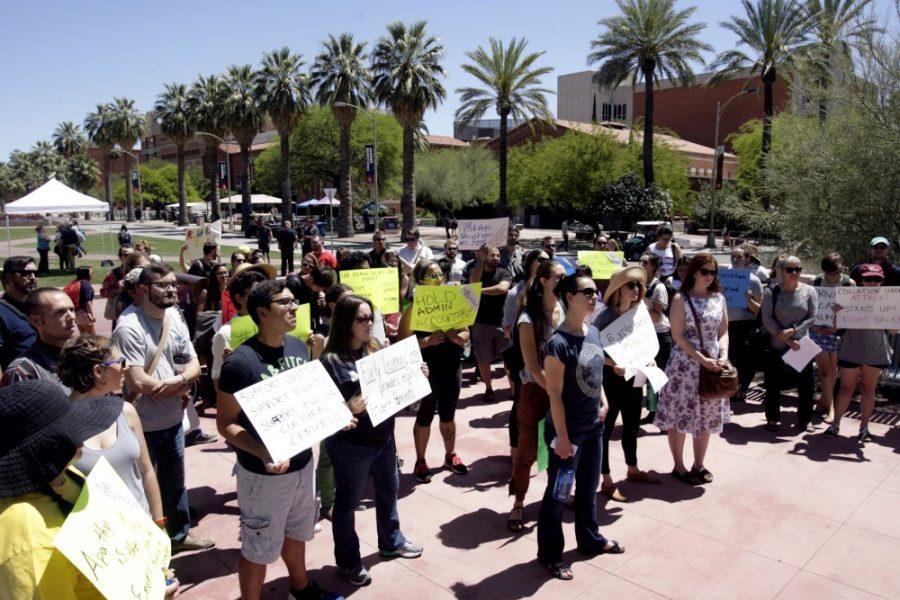Graduate students staged a university-wide walkout Thursday in protest of graduate student and adjunct professor working conditions.
The group is specifically calling for stipends to be raised to a “living wage,” along with the inclusion of free health care and child care.
A crowd formed near the steps of Old Main on Thursday. Equipped with a sign-making station and a small group spray painting #walkoutUA on the front and back of T-shirts, the group began to slowly swell as the official start time of the walkout grew nearer.
Those who gathered were largely representing graduate students and graduate student teachers in the humanities and social sciences — disciplines the protesters say are devalued in comparison to the UA’s STEM fields.
Most doctoral and master’s students are supported through graduate assistantships, which are nine-month, half-time appointments that include stipends, tuition waivers and annual health care assistance, according to a document given to the Daily Wildcat from the Office of University Relations. The document also cites a multitude of scholarships and fellowships that help fund graduate students.
While each graduate assistant is awarded a stipend when they are appointed as assistant, the amount they receive is dictated by the discipline they are pursuing. This is the issue, according to those at the walkout.
“It’s not that the job is bad,” said Alex Schweig, a graduate assistant teacher in the history department. “It’s that the conditions of the job are bad.”
READ: ‘Have a Hart? Ours is at DeVry’
Stipends range from a minimum $9,600 to $28,588 at maximum. Graduate assistants’ pay rates in the humanities and the social sciences are usually on the lower end of the spectrum.
Rev. Ben Garren, the Episcopal chaplain at the UA, was adamant about change and explained the situations he has seen from the graduate student stipends.
“The reality is that we have grad students that are already on food stamps and are starving,” Garren said. “Encountering this regularly in my work makes me want to come out here and makes me want to stand with the grad students and say that this needs to be dealt with on a systematic level.”
Nataly Reed, an adjunct lecturer in the English department, was there representing herself and her husband, who’s also a graduate student. Reed said both she and her husband have a difficult time making ends meet with the wages provided to them by the university.
Reed said health care has also become an issue in addition to the low wages. The UA covers health insurance premiums for graduate assistants or associates at UA Campus Health. Up until last year, this same health insurance plan was extended to the spouses of graduate assistants. This year the extended coverage to the spouses was stripped from the plan because of budget cuts. Reed said this has placed an extra burden on her family in addition to their already strained budget.
Reed acknowledged there are always budget limitations within the departments, but she said that at some point, the cuts have to stop.
While a group congregated near the east-facing steps of Old Main in preparation for the walkout, it didn’t officially begin until noon and lasted a few hours.
Undergraduate students from Movimiento Estudiantil Chicano/a de Aztlan stood in solidarity with the graduate student protesters, who took to the UA Mall and Old Main with chants demanding that UA President Ann Weaver Hart step down from her position at the UA.
Alex Karaman, a founding member of the Graduate Student Organizing Committee and one of the organizers of the walkout, led a discussion with a group of speakers during the beginning of the demonstration.
The discussion touched upon different issues that affect not just graduate students, but the entire UA student body.
“We are trying to draw attention to a range of issues that are very connected having to do with, on one hand, the increasing tuition and fees at the UA,” Karaman said. “We are also trying to bring attention to issues that relate to the support and retention of students of color and low income students, and to draw attention to labor conditions on campus.”
Follow Sam Gross on Twitter.










